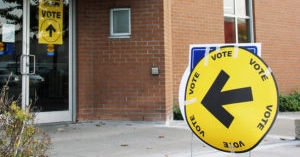The last time we had a federal election, Stephen Harper and the Conservative party won a majority government with less than 40 per cent of votes.
Such is the way for Canada, a country with the first-past-the-post system.
As many Canadians continue to grow tired of a Conservative government, the practice of strategically voting has gained a bit of momentum.
Strategic voting is the idea of voting for the Member of Parliament (MP) that you feel has the best chance at usurping an unwanted candidate, rather than for the MP that best represents you.
Websites like strategicvoting.ca are trying to convince people to vote for the party in their riding that is most likely to win over the Conservatives. Though the party with the best chance to win may not be the one a voter would most agree with, the overriding goal to eliminate the Conservative regime might be worth the vote. The website breaks down the election with statistics based on previous voting trends and recommends which party Progressive voters in each riding should vote for.
In the 2011 election, the Conservative Party won a majority with 166 seats, followed by the NDP (103), Liberal (34), Bloc Quebecois (4), and Green (1). The strategic voting website calculates that if strategic voting had been utilized to full effect during the 2011 election, the NDP would have won a minority government with 125 seats and the Liberal Party would have more than doubled its seat count with 75 seats. Based on the site’s projections, the Conservatives would have lost 64 seats due to strategic voting.
But is this actually an ideal way to vote? First of all, it is impossible to get all voters on board with any kind of organized plan. The numbers on the site refer to the best-case scenario for strategic voting, and they wouldn’t be totally accurate if strategic voting had been more — but not 100 per cent — utilized in the 2011 election.
Secondly, doesn’t it make more sense to vote for the person you feel most comfortable with representing you? When you’re voting, you aren’t just voting for a party leader. You are voting someone into Parliament that will represent you in the House of Commons. While MPs do tend to vote alongside their party, there are cases of individuals straying and voting the way they feel is best for their constituents. Looking at openparliament.ca, you can see that there are some MPs who will sometimes vote differently than their party.
Finally, is Harper really the issue here, or is he just the current figurehead for the most scrutinized profession in the country? I don’t recall a government that made it through a term without any kind of backlash or controversy.
Organizing strategic voting seems like an act of propaganda. It’s impossible that the act would just fix everything. There’s no way to please every Canadian, and any political leader will make mistakes. Instead of giving into the Harper-bashing, just go out and vote for the representative you think will serve you and your neighbours best.
All statistics are from Elections Canada and strategicvoting.ca.
Photo by Can Pac Swire, Flickr Creative Commons.





0 Comments